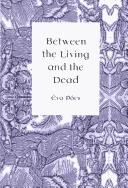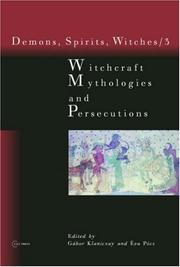| Listing 1 - 8 of 8 |
Sort by
|

ISBN: 0585358370 9780585358376 9786155225307 6155225303 9639116181 9789639116184 963911619X 9789639116191 Year: 2022 Publisher: Budapest New York
Abstract | Keywords | Export | Availability | Bookmark
 Loading...
Loading...Choose an application
- Reference Manager
- EndNote
- RefWorks (Direct export to RefWorks)
Éva Pócs, one of the most highly respected scholars of historical anthropology, has undertaken extensive research on the history of folk beliefs connected with communication and the supernatural sphere. In this book, she examines the relics of European shamanism in early modern sources, and the techniques and belief-systems of mediators found in the records of witchcraft trials from the sixteenth to the eighteenth century. The book explores the various communication systems known to early modern Hungarians, describes the role of these systems in everyday village life, and shows how they were connected to contemporary European systems, as well as new types of mediators and systems which function right up to the twentieth century. Representing a major contribution to the most up-to-date international research, Eva Pócs draws on significant East European material and literature not previously co-ordinated with that from the West.
Witchcraft --- History. --- Europe --- History --- Anthropology, Cultural studies, Early modern Europe, Folklore, Witchcraft. --- SPIRITUALISTS --- WITCHCRAFT --- OCCULTISM --- BODY, MIND & SPIRIT --- Spiritualists --- Occultism --- Body, Mind & Spirit --- Body, mind & spirit
Book
Year: 1989 Publisher: Helsinki Suomalainen tiedakatemia
Abstract | Keywords | Export | Availability | Bookmark
 Loading...
Loading...Choose an application
- Reference Manager
- EndNote
- RefWorks (Direct export to RefWorks)
Book
ISBN: 9781527522312 Year: 2019 Publisher: Newcastle upon Tyne Cambridge Scholars Publishing
Abstract | Keywords | Export | Availability | Bookmark
 Loading...
Loading...Choose an application
- Reference Manager
- EndNote
- RefWorks (Direct export to RefWorks)
Book
ISBN: 3319547569 3319547550 Year: 2017 Publisher: Cham : Springer International Publishing : Imprint: Palgrave Macmillan,
Abstract | Keywords | Export | Availability | Bookmark
 Loading...
Loading...Choose an application
- Reference Manager
- EndNote
- RefWorks (Direct export to RefWorks)
This book provides a selection of studies on witchcraft and demonology by those involved in an interdisciplinary research group begun in Hungary thirty years ago. They examine urban and rural witchcraft conflicts from early modern times to the present, from a region hitherto rarely taken into consideration in witchcraft research. Special attention is given to healers, midwives, and cunning folk, including archaic sorcerer figures such as the táltos; whose ambivalent role is analysed in social, legal, medical and religious contexts. This volume examines how waves of persecution emerged and declined, and how witchcraft was decriminalised. Fascinating case-studies on vindictive witch-hunters, quarrelling neighbours, rivalling midwives, cunning shepherds, weather magician impostors, and exorcist Franciscan friars provide a colourful picture of Hungarian and Transylvanian folk beliefs and mythologies, as well as insights into historical and contemporary issues.
Witchcraft --- Demonology --- Demonology, Christian --- Demons --- Evil spirits --- Spirits --- Spiritual warfare --- Black art (Witchcraft) --- Sorcery --- Occultism --- Wicca --- Europe-History-1492-. --- Europe, Central-History. --- Russia-History. --- Civilization-History. --- History of Early Modern Europe. --- History of Germany and Central Europe. --- History of Modern Europe. --- Russian, Soviet, and East European History. --- Cultural History. --- Europe—History—1492-. --- Europe, Central—History. --- Russia—History. --- Europe, Eastern—History. --- Civilization—History.
Digital
ISBN: 9783319547565 Year: 2017 Publisher: Cham Springer International Publishing :Imprint: Palgrave Macmillan
Abstract | Keywords | Export | Availability | Bookmark
 Loading...
Loading...Choose an application
- Reference Manager
- EndNote
- RefWorks (Direct export to RefWorks)
This book provides a selection of studies on witchcraft and demonology by those involved in an interdisciplinary research group begun in Hungary thirty years ago. They examine urban and rural witchcraft conflicts from early modern times to the present, from a region hitherto rarely taken into consideration in witchcraft research. Special attention is given to healers, midwives, and cunning folk, including archaic sorcerer figures such as the táltos; whose ambivalent role is analysed in social, legal, medical and religious contexts. This volume examines how waves of persecution emerged and declined, and how witchcraft was decriminalised. Fascinating case-studies on vindictive witch-hunters, quarrelling neighbours, rivalling midwives, cunning shepherds, weather magician impostors, and exorcist Franciscan friars provide a colourful picture of Hungarian and Transylvanian folk beliefs and mythologies, as well as insights into historical and contemporary issues.
History of civilization --- History --- History of Germany and Austria --- History of Eastern Europe --- History of Europe --- nieuwste tijd --- cultuurgeschiedenis --- geschiedenis --- Europese geschiedenis --- nieuwe tijd --- Franciscans --- Hungary --- Russia --- Eastern and Central Europe --- Transylvania --- Europe
Book
ISBN: 9633864135 Year: 2022 Publisher: Budapest : Central European University Press,
Abstract | Keywords | Export | Availability | Bookmark
 Loading...
Loading...Choose an application
- Reference Manager
- EndNote
- RefWorks (Direct export to RefWorks)
"Possession, a seemingly irrational phenomenon, has posed challenges to generations of scholars rooted in Western notions of body-soul dualism, self and personhood, and a whole set of presuppositions inherited from Christian models of possession that was "good" or "bad." The authors of the essays in this book present a new and more promising approach. They conceive spirit possession as a form of communication, of expressivity, of culturally defined behavior that should be understood in the context of local, vernacular theories and empiric reflections. With the aim of reformulating the comparative anthropology of spirit possession, the editors have opened corridors between previously separate areas of research. Together, anthropologists and historians working on several historical periods and in different European, African, South American, and Asian cultural areas attempt to redefine the very concept of possession, freeing it from the Western notion of the self and more clearly delineating it from related matters such as witchcraft, devotion, or mysticism. The book also provides an overview of new research directions, including novel methods of participant observation and approaches to spirit possession as indigenous historiography"--
Book
ISBN: 9786155225109 9786155225482 6155225486 6155225109 Year: 2013 Publisher: Budapest Central European University Press
Abstract | Keywords | Export | Availability | Bookmark
 Loading...
Loading...Choose an application
- Reference Manager
- EndNote
- RefWorks (Direct export to RefWorks)
n medieval and early modern Europe, the use of charms was a living practice in all strata of society. The essays in this latest CEU Press publication explore the rich textual tradition of archives, monasteries, and literary sources. The author also discusses texts amassed in folklore archives and ones that are still accessible through field work in many rural areas of Europe.
Charms --- Incantations --- Charmes --- History. --- Histoire --- History of Europe --- Esoteric sciences --- Philosophy and psychology of culture --- Spells --- Magic --- Rites and ceremonies --- Demonology --- Magical thinking --- Superstition --- Witchcraft --- Amulets --- Talismans --- Anthropology, Baltic Countries, Ethnology, Folklore, Healing, Medieval, Nordic countries, Portugal. --- European 1 : --- General & Multiperiod. --- Charms-Europe-History. --- Incantations-Europe-History.

ISBN: 9789637326875 9781435648272 1435648277 1283248018 9781283248013 9786155211508 6155211507 9637326871 Year: 2008 Publisher: Budapest Central European University Press
Abstract | Keywords | Export | Availability | Bookmark
 Loading...
Loading...Choose an application
- Reference Manager
- EndNote
- RefWorks (Direct export to RefWorks)
This third, concluding volume of the series publishes 14 studies and the transcription of a round-table discussion on Carlo Ginzburg's Ecstasies. The themes of the previous two volumes, Communicating with the Spirits, and Christian Demonology and Popular Mythology, are further expanded here both as regards their interdisciplinary approach and the wide range of regional comparisons. While the emphasis of the second volume was on current popular belief and folklore as seen in the context of the historical sources on demonology, this volume approaches its subject from the point of view of historical anthropology. The greatest recent advances of witchcraft research occurred recently in two fields: (1) deciphering the variety of myths and the complexity of historical processes which lead to the formation of the witches' Sabbath, (2) the micro-historical analysis of the social, religious, legal and cultural milieu where witchcraft accusations and persecutions developed. These two themes are completed by some further insights into the folklore of the concerned regions which still carries the traces of the traumatic historical memories of witchcraft persecutions.
Esoteric sciences --- Christian dogmatics --- Witchcraft. --- Black art (Witchcraft) --- Sorcery --- Occultism --- Wicca --- Conference, Demonology, Folklore, Persecutions, Witchcraft.
| Listing 1 - 8 of 8 |
Sort by
|

 Search
Search Feedback
Feedback About UniCat
About UniCat  Help
Help News
News